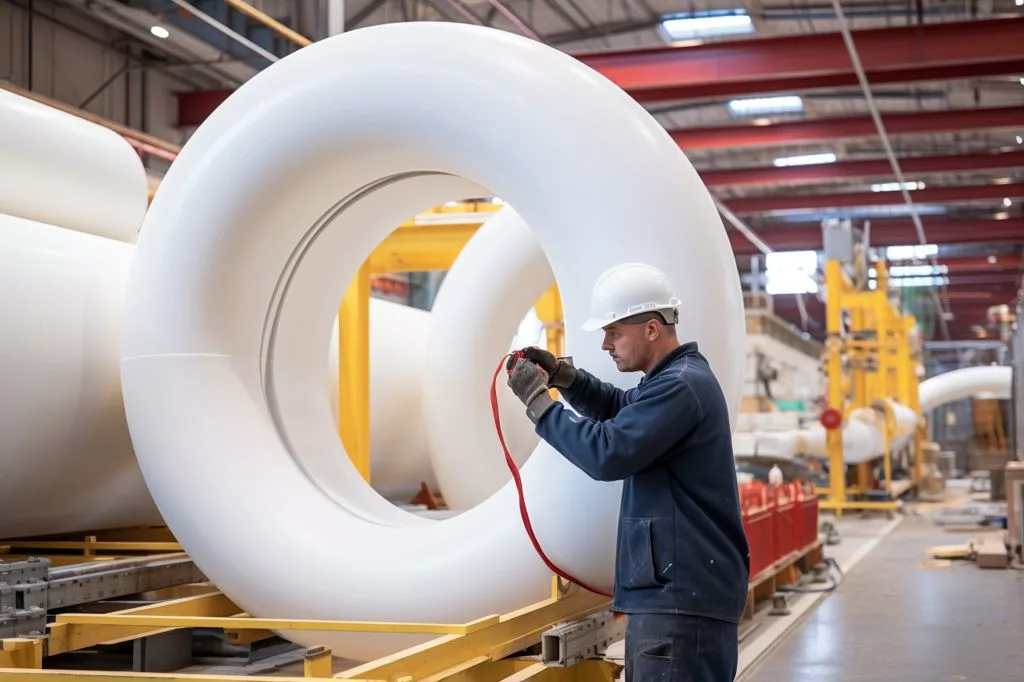BT Industrial Group’s R523 million investment commitment in South Africa’s Benoni region will create 600 new job opportunities in eco-friendly manufacturing. The investment will focus on three projects: high-density polyethylene pipes and fittings to strengthen water infrastructure, food-grade sustainable plastics to reduce ocean plastic waste, and vascular access management syringes to improve healthcare. The company’s dedication to innovation, job creation, and environmentally conscious practices showcases a model for sustainable growth in the manufacturing industry.
What is BT Industrial Group’s impact on the local economy?
BT Industrial Group’s R523 million investment commitment will create 600 new job opportunities in the Benoni region of South Africa. The investment is designated for three projects: high-density polyethylene pipes and fittings, food-grade sustainable plastics, and vascular access management syringes, aimed at strengthening the water infrastructure, reducing ocean plastic waste, and improving healthcare. The company’s dedication to innovation, eco-conscious practices, and job creation showcases a model for sustainable growth in the manufacturing industry.
BT Industrial Group’s Impact on Local Economy
BT Industrial Group, an esteemed multi-award-winning manufacturing firm located in Benoni, Ekurhuleni, is set to have a significant effect on the regional economy. Their R523 million investment commitment, announced at the fifth South African Investment Conference led by President Cyril Ramaphosa in Johannesburg in April, will create 600 new employment opportunities. This pledge helps the total investment commitments surpass President Ramaphosa’s initial R1.2 trillion goal, reaching an impressive R1.51 trillion over a five-year mobilization timeframe.
As an international manufacturing frontrunner, BT Industrial is proficient in creating and providing essential products such as water infrastructure plastic pipes, optical fibre, and clinical environment-compatible polymer-based medical fabrics and components. According to the company’s Founder and Group Managing Director, Mr. Kgomotso Lekola, their significant investment is designated for three crucial ventures.
Three Key Projects for Development
The first project will see an investment of R325 million in the production of high-density polyethylene (HDPE) pipes and fittings. This effort seeks to strengthen the water infrastructure and generate new jobs, greatly benefiting the local community. The second project, with an allocation of R76 million, aims to manufacture food-grade sustainable plastics. Recognizing the urgent global need for eco-friendly solutions, BT Industrial is investing in advanced technology to develop food-grade recycled plastics. In doing so, the firm aims to reduce Africa’s 8% contribution to ocean plastic waste.
The third project, with an investment of R122 million, is focused on producing vascular access management syringes. This endeavor not only improves healthcare but also provides job opportunities. Vascular access management is crucial for patient care, and BT Industrial’s innovative syringes will streamline processes, minimize waste, and improve patient results.
Mr. Lekola emphasizes the importance of eco-friendly solutions in the plastics sector. He highlights the rising demand for food-grade recycled plastics in Europe and how BT Industrial’s technology surpasses industry standards by eliminating impurities and preventing degradation. In the plastics project, Lekola explains that the entire annual production of 15,000 metric tonnes of food-grade sustainable plastics will be exported to countries in Oceania and the European Union.
International Market Presence and Savings
Moreover, the syringes project aims to globally export all 30 million vascular access management syringes, enhancing South Africa’s presence in the international market. Lekola discloses, “Our research estimates that approximately R2.5 billion is spent on vascular access management in South Africa. The BT range of prefilled syringes will save the national healthcare system approximately R1.5 billion by reducing preparation time by 98%, cutting medical waste by 80%, and enhancing patient clinical outcomes.”
With BT Industrial’s significant investment, South Africa’s manufacturing landscape is set for an extraordinary transformation. The company’s dedication to creating 600 jobs and concentrating on environmentally friendly solutions demonstrates their commitment to progress and development. By investing in cutting-edge technology and inventive projects, BT Industrial is redefining the industry and significantly contributing to the nation’s wealth.
The company’s achievements showcase the potential for South African manufacturing enterprises to overcome the challenges of the 21st century. By emphasizing sustainable solutions, job creation, and the global export of high-quality products, BT Industrial serves as a role model for other companies to emulate.
A Model for Sustainable Growth in Manufacturing
In a time when job creation and eco-friendly manufacturing are of utmost importance, BT Industrial Group’s investment commitment is a victory. As the company embarks on its three vital projects, its dedication to innovation, environmental accountability, and community development will leave a lasting impression on South Africa’s manufacturing sector.
BT Industrial Group’s investment and industry expansion narrative offers a roadmap for sustainable growth in the manufacturing field. Their emphasis on eco-conscious practices, job creation, and exporting top-quality products globally highlights the opportunities available to South African businesses ready to tackle the challenges of an ever-changing world.
In conclusion, BT Industrial’s investment commitment and subsequent projects serve as a shining example of the power of innovation, sustainability, and forward-thinking in South Africa’s manufacturing sector. By embracing these principles, the company is not only generating jobs and enhancing the economy but also playing a vital role in preserving the environment for future generations.
1. What is BT Industrial Group’s impact on the local economy?
BT Industrial Group’s R523 million investment commitment will create 600 new job opportunities in the Benoni region of South Africa. The investment is designated for three projects: high-density polyethylene pipes and fittings, food-grade sustainable plastics, and vascular access management syringes, aimed at strengthening the water infrastructure, reducing ocean plastic waste, and improving healthcare. The company’s dedication to innovation, eco-conscious practices, and job creation showcases a model for sustainable growth in the manufacturing industry.
2. What are the three key projects that BT Industrial Group is developing?
The three key projects that BT Industrial Group is developing are:
– High-density polyethylene pipes and fittings to strengthen water infrastructure
– Food-grade sustainable plastics to reduce ocean plastic waste
– Vascular access management syringes to improve healthcare
3. How much is BT Industrial Group investing in each project?
BT Industrial Group is investing R325 million in the production of high-density polyethylene pipes and fittings, R76 million in manufacturing food-grade sustainable plastics, and R122 million in producing vascular access management syringes.
4. What is the purpose of the high-density polyethylene pipes and fittings project?
The high-density polyethylene pipes and fittings project aims to strengthen the water infrastructure and generate new jobs, greatly benefiting the local community.
5. What is the purpose of the food-grade sustainable plastics project?
The food-grade sustainable plastics project aims to manufacture eco-friendly solutions to the urgent global need for reducing plastic waste. BT Industrial is investing in advanced technology to develop food-grade recycled plastics, hoping to reduce Africa’s 8% contribution to ocean plastic waste.
6. What is the purpose of the vascular access management syringes project?
The vascular access management syringes project aims to improve healthcare and provide job opportunities. Vascular access management is crucial for patient care, and BT Industrial’s innovative syringes will streamline processes, minimize waste, and improve patient results.
7. What is BT Industrial Group’s Founder and Group Managing Director, Mr. Kgomotso Lekola’s view on the importance of eco-friendly solutions in the plastics sector?
Mr. Kgomotso Lekola highlights the rising demand for food-grade recycled plastics in Europe and how BT Industrial’s technology surpasses industry standards by eliminating impurities and preventing degradation. In the plastics project, Lekola explains that the entire annual production of 15,000 metric tonnes of food-grade sustainable plastics will be exported to countries in Oceania and the European Union.
8. How will BT Industrial Group’s syringes project benefit the national healthcare system in South Africa?
BT Industrial Group’s syringes project aims to globally export all 30 million vascular access management syringes, enhancing South Africa’s presence in the international market. Lekola discloses, “Our research estimates that approximately R2.5 billion is spent on vascular access management in South Africa. The BT range of prefilled syringes will save the national healthcare system approximately R1.5 billion by reducing preparation time by 98%, cutting medical waste by 80%, and enhancing patient clinical outcomes.”








